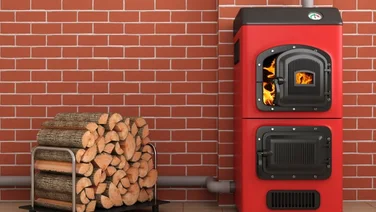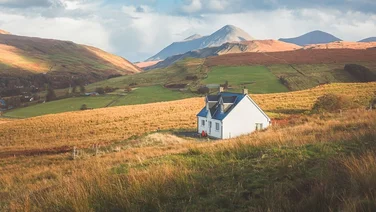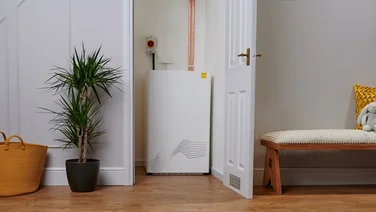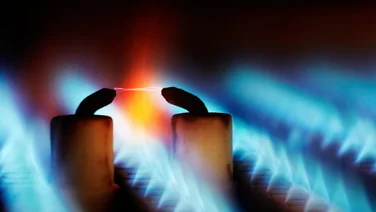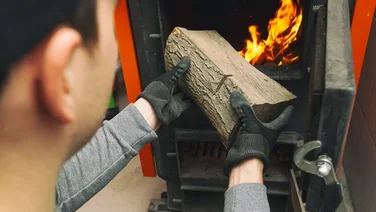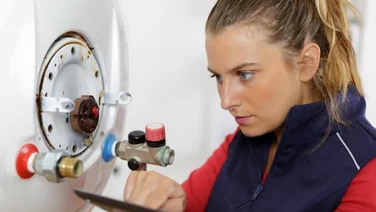We receive a small fee from trusted installers when you request a quote through our site. This helps us keep our content independent, well-researched and up to date – Learn more
✔ Unvented hot water cylinders generally cost between £300 and £2,000
✔ It costs between £500 and £1,500 to install a new unvented hot water cylinder
✔ There’s no risk of frozen loft pipes with an unvented hot water cylinder
Ever felt like ditching your boiler’s large cold water tank and considering the cost of a new boiler? Well, with a megaflow boiler, you can do away with the cold water tank and seriously improve your home’s water pressure. It’s a win-win.
Although it sounds fun, ‘megaflow’ is not actually a type of boiler – the technical name for these high-pressure machines is ‘unvented hot water cylinder’.
A company called Heatrae Sadia manufacture an unvented hot water cylinder called a Megaflo, which is how this confusion all started.
Ready and raring to go? Great! You can even skip the reading and head over to our form now. Once you’ve entered your details, our local boiler installers will be in touch with free quotes.

What’s in this guide to unvented hot water cylinders?
01 | How much do unvented hot water cylinders cost?
02 | What size cylinder do you need?
03 | How do unvented hot water cylinders work?
04 | Pros and cons of unvented hot water cylinders
05 | Best unvented hot water cylinder brands
06 | Finding an installer
How much do unvented hot water cylinders cost?
The cost of an unvented hot water cylinder can vary wildly, ranging from around £300 to more than £2,000 for the largest, higher-end models.
Check out the table below for the typical price ranges of unvented hot water cylinders that have been made by some of the best boiler brands.
Alternatively, our guide on how much do new boilers cost has lots of helpful information.
|
Brand |
Cylinder capacity (litres) |
Price range |
|---|---|---|
| Heatrae Sadia | 70 – 500 | £550 – £2,250 |
| Worcester Bosch | 90 – 300 | £630 – £1040 |
| Gledhill | 90 – 400 | £290 – £1,200 |
| Telford | 90 – 400 | £320 – £1,230 |
Prices last updated in January 2021.
When it comes to the cost of installing an unvented hot water cylinder, you should expect to pay somewhere between £500 and £1,500 – it all depends on how much work needs doing.
If you’re just replacing an old unvented hot water cylinder, the cost will be cheaper, falling between £275 and £450.
High-pressure boilers always cost more to install than regular boilers, as they require a boiler specialist who really knows their onions (and is a G3-qualified installer).
If you don’t get your unvented hot water cylinder professionally installed, you’re likely to miss out on the warranty (typically 25 years).
What size cylinder do you need?
You need a cylinder that can provide your home with enough hot water – but if the cylinder’s too big, then you’ll be wasting money. Here’s a rough guide to cylinder sizes for different properties:
| Number of bedrooms | Number of bathrooms/showers | Indirect system (litres) | Direct system (litres) |
| 1 | 1 | 75 – 120 | 120 – 150 |
| 2 | 1 | 150 | 180 |
| 3 | 1 or 2 | 180 | 210 |
| 4 | 2 | 210 – 250 | 250 – 300 |
| Larger properties | 2 or more | 300+ | 300+ |
Of course, these figures should only be used as a rough guide. Your cylinder size will also depend on how much water each resident tends to use, and how likely they are to use the hot water at the same time.
You’re probably wondering how much hot water your house uses. The Hot Water Assocation explains that each person typically uses around 35-45 litres daily, which means that a four-person household gets through about 200 litres every day.
However, this doesn’t mean that you need a 200-litre cylinder; you just need something that’s big enough to hold the total quantity of water that will be required at any one time.
To get bespoke, free quotes from qualified boiler installers, fill in this short form, and we’ll get back to you.
Other requirements to think about
What is your mains pressure? Your mains water pressure should be at least 1 to 1.5 bars (and your flow rate at least 20 litres per minute) for a megaflow system to be worth installing.
While your installer will be able to check this for you, you can check it yourself with a pressure gauge, a measuring container called a Weir gauge, or a measuring jug and a stopwatch.
There are solutions to poor pressure and flow, including accumulator tanks, pumps, and even laying a new pipe to supply your home, though new pipework is costly and disruptive.
How old are your radiators? If your heating system is quite old, an unvented hot water cylinder could produce water at a higher pressure than your pipes and radiators can handle – meaning you’d need to have work done to fix this.
How do unvented hot water cylinders work?
The important thing about unvented hot water cylinders is that they’re connected directly to the cold mains water feed, bypassing the need for a cold water tank, and creating very high water pressure (up to 22 litres per minute).
This means that your baths fill up more quickly, your showers are more powerful, and you can have multiple hot water sources going simultaneously.
Once the cold water enters the cylinder from the mains, it is heated up either directly (by an immersion heater) or indirectly (by a central heating boiler or a solar thermal system).
Indirect cylinders heat up water faster than direct cylinders, so they’re smaller and more compact, but they also tend to be more expensive.
The cylinder, made from stainless steel or copper, will store the hot water until you need it. Then, whenever you turn on a shower or a tap, cold water rushes into the cylinder and pushes the hot water out the other end.
All unvented hot water cylinders require an expansion vessel, which makes room for the water to expand as it heats up.

Pros and cons of unvented hot water cylinders
Is an unvented hot water cylinder right for you? Take a look at the advantages and disadvantages below, and compare it to conventional boilers and combi boilers.
Advantages of unvented hot water cylinders
✔ You can run several hot water taps at the same time – ideal for large families, shared houses, or anywhere where several people might want to enjoy a shower, bath or sink wash at once.
✔ You’ll save space compared with a traditional system – you don’t need to have a loft for your tank, and if you do have a loft, you can use it for other things. Unvented hot water cylinders also tend to be less noisy than traditional systems.
✔ It’s suitable if your home doesn’t have a gas supply – you can heat the water with an electric immersion heater instead.
✔ The water can’t get contaminated – it’s not sitting around in a tank for days or weeks on end. An unvented cylinder system is completely sealed.
✔ There’s no risk of frozen loft pipes – or the subsequent flooding when they then burst.
✔ You can put the unvented hot water cylinder almost anywhere you like – after all, you’re not relying on gravity to move the water around your home.
Disadvantages of unvented hot water cylinders
✘ You still need space for the unvented hot water cylinder – if saving space if your biggest priority, a combi boiler is your best bet.
✘ You don’t have unlimited hot water on demand – you have as much as the cylinder holds, and if it runs out or cools over time, you’ll be washing in cold water until it heats up again. Emergency immersion heaters can help with this problem.
✘ Any unused hot water wastes energy – if you don’t use all the hot water in the cylinder, it will eventually go cold, meaning you’ve wasted money and energy heating it. Good insulation of the unvented hot water cylinder should reduce this issue (duplex stainless steel cylinders have great heat retention).
✘ Megaflow cylinders aren’t compatible with solid fuel burners – or any other boiler without a thermostat, unless you install extra safety measures to combat the risk of the water overheating. They’re also not compatible with some power showers, mixer taps, or ascending spray bidets.
Best unvented hot water cylinder brands
Heatrae Sadia
Founded in Norwich almost 100 years ago, Heatrae Sadia is now the UK’s biggest manufacturer of electric water heaters, and sells its products worldwide.
It manufactures both Megaflo cylinders, having bought the brand in 1993, and the more budget-friendly PremierPlus range. Megaflo cylinders are tested to withstand 15 bars of pressure – five times the normal operating pressure.
Worcester Bosch
Widely respected as a reliable boiler manufacturer, and with a 4.7-star rating on the Trustpilot review site, Worcester Bosch even has a royal warrant.
Its Greenstore unvented cylinders are designed to work with its Greenstar boilers and Greenskies solar panels – though of course they can be used with other brands too – and range in size from 90 litres to 300 litres.
Gledhill
Founded by brothers Norman and Joe Gledhill in Blackpool in 1926, Gledhill has manufacturing depots across the UK, and its StainlessLite cylinders are among the lightest on the market.
The StainlessLite Plus Horizontal Indirect cylinder is, as the name suggests, fitted horizontally – meaning it can be installed in places where headroom is restricted, such as lofts.
Telford
A family-run business based in – you guessed it – Telford, the company has been making unvented cylinders since 2002, including prestigious products like the Telford Tornado and Telford Tempest.
The latter comes with a lifetime guarantee, a capacity of up to 500 litres for domestic use, and is made from stainless steel that’s up to 40% thicker than some of its rivals. And if you thought 500 litres was large, a commercial-sized Tempest can hold up to 4,000 litres.
Finding an installer
The Eco Experts can help you find a professional, qualified installer for your new boiler, for free. All you have to do is pop your details in this form, and our suppliers will be in touch with their best prices.

